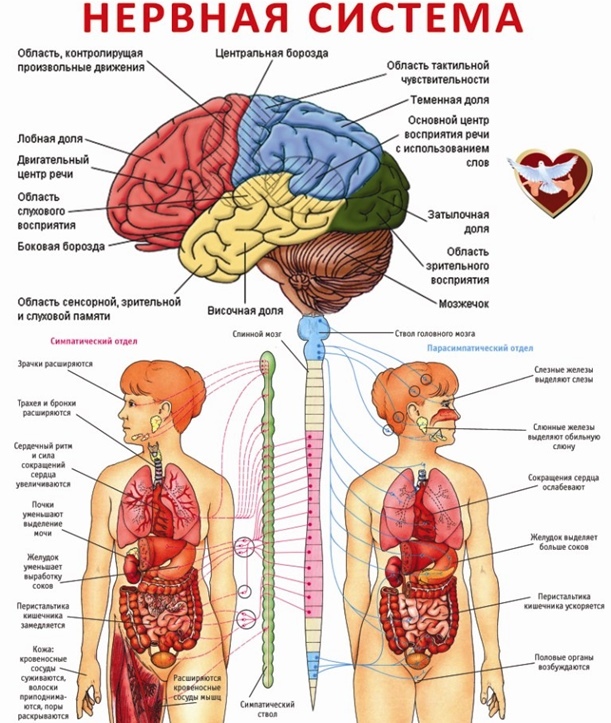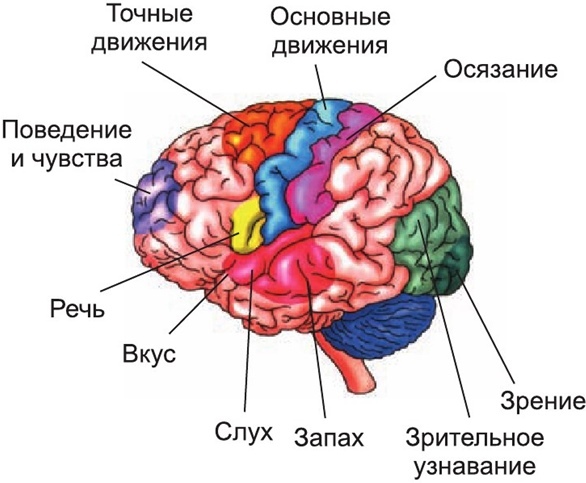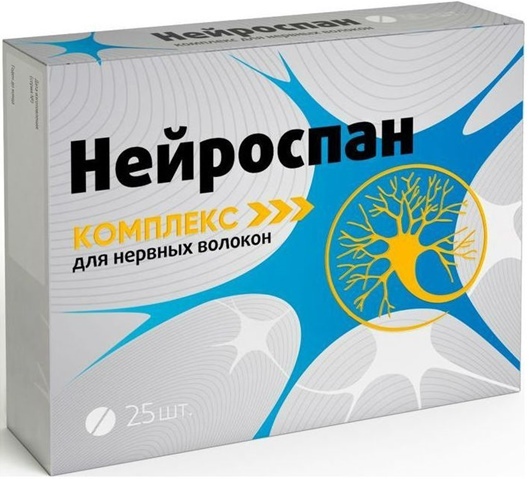Content
- Nervous system and age
- What awaits us: normal aging of the brain
- Age-related changes in the brain
- Associated aggressive factors
- What to do?
- Is it possible to curb age-related changes with B vitamins?
- Neurospan complex for nerve fibers
The search for the source of eternal life has been and continues to interest people for centuries. And among the scientists there are those who are conducting these searches. And just restraining the processes of natural aging of the brain and even more complete cessation is the best source of eternal youth. Physiological age-related changes in the central nervous system are a slippery slope, which must be tread carefully, but how to protect yourself from “falls”? First of all, you need to understand what is happening, and there is a solution.

Nervous system and age
Throughout life, our body, all organs and systems change: in childhood they mature, learn to work, adapt to environmental conditions, and in the elderly they are subject to aging. Already by 4-8 weeks of life, the child has a conscious reaction to parents and acquaintances - emotions in the form of a smile. In old age, the brain changes, which can be combined with the term - aging of the brain.
The functioning of the central nervous system is provided by neurons - structural cells of the nervous system. Their task is to process the received signals from internal organs, the environment and redirect them to the processing center - the brain. The transmission of these signals from one cell to another is carried out by the synapse - the place of contact between two cells of the nervous system.
"Nerve cells - not regenerating" is a famous expression, and it has a scientific basis. With age, the ability of nerve cells to regenerate decreases. According to the data in people after 60, the number of neurons decreases by 10-20%, by 65 - 30%, etc.
What awaits us: normal aging of the brain
As people age, the brain also undergoes changes. Forgetfulness, absent-mindedness is a normal part of aging, but the appearance of the first symptoms of age-related changes remains unnoticed.
The appearance of similar symptoms in elderly patients is more likely to cause concern. Such symptoms are associated with serious diseases and memory impairments, such as Alzheimer's disease. But such pathologies are not part of natural aging, they are a disease and must be treated.
Common memory changes associated with the normal aging process include:
- Communication difficulties
Mastering new information requires more effort and time, and the effect cannot be compared with learning at a young age.
- Multitasking in the past
Contrary to popular belief, no one person can fully focus on 2 or more tasks at the same time. The brain is constantly rebuilding from one to the other, but with age, the speed of these transitions slows down. Therefore, it is more difficult for a person to plan and carry out several parallel tasks at once.
- Remember numbers, names and dates
Strategic memory, which helps to remember names, numbers begins to deteriorate after 20 years and every year these manifestations are more noticeable.
- Forgetfulness
Crosses on the wrist, notes and a day planner - without this, many elderly people cannot plan their day and lead a normal social life. The fact is that the brain stores information about meetings in a certain store and every year it becomes more difficult to obtain information.
Age-related changes in the brain
The human brain as the main part of the central nervous system is the most mysterious part of the human body. And today the brain is a giant puzzle, but every year it is being solved. Today, one thing can be said for certain - with aging of the brain, structural changes occur:
- Weight reduction
Due to neuronal death and low regeneration, the frontal lobe and hippocampus contract, these are areas that are responsible for cognitive functions and coordinate new memories. Such changes are noticeable at the age of 60-70 years.
- Bark density changes
With age, synaptic connections also suffer and there is a thinning of the outer shell of the brain - the cortex. This leads to a slowdown in the processing of the information received.
- White matter
These are myelinated nerve fibers that are linked in tracts and carry nerve signals between brain cells. From the damaged myelin sheath, signals along the nerves cannot be transmitted in full, hence the corresponding symptoms are formed.
- Production of neurotransmitters
With age, the ability of the brain to produce chemical messengers decreases, which facilitate the transmission of nerve impulses. This can be explained by a decrease in the activity of dopamine, acetylcholine, serotonin. This predisposes not only to cognitive decline, but also depression.

Associated aggressive factors
Sometimes age-related changes (not only in the nervous system) become predisposing factors for the development of serious pathologies, for example, Alzheimer's or Parkinson's disease.
But for their development, the action of predisposing factors is necessary: hereditary predisposition, the action of chronic stress, etc.
Any infection affecting the nervous system can disrupt the physiological course of age-related changes. Lack of full-fledged rehabilitation and treatment can worsen the prognosis.
A number of studies show that being overweight and obese accelerates brain aging and occurs 10 years faster. The abuse of sugary soda, even if it contains sugar substitutes, is also associated with poor brain health with all the ensuing consequences.
Especially carefully for changes in the central nervous system should be monitored for people suffering from diabetes mellitus type I and II. Poorly controlled blood sugar is the cause of polyneuropathy and other changes associated with impaired cognitive function.
What to do?
A growing body of evidence suggests that simple actions can help control the natural aging of the brain and stimulate the recovery of the nervous system:
- active lifestyle;
- engaging in intellectually stimulating activities;
- maintaining social contacts;
- relief of stress;
- full sleep.
Several studies have shown that a combination of cardio and strength training 2-3 times a week for at least 45 minutes a day supports cognitive performance in people 50 and older. Physical activity doesn't mean going to the gym and boring activities. Research from the German Center for Neurodegenerative Diseases shows that different types of dance have the same "healing" effect.
Nutrition is one of the ways to maintain health, including the nervous system. After all, this is the only source of nutrients that will support the nervous system, as well as contribute to its recovery.
2018 data showed that adequate amounts of omega-3 and -6 fatty acids must be present in the diet to maintain normal brain function and physiological aging. A full intake of B vitamins contributes to the maintenance of the normal function of nerve fibers.
However, it is not always possible to guarantee that the "natural" sources of the vitamin, that is, from food, come in sufficient quantities and are absorbed. Therefore, additional sources can be recommended - nutritional supplements with B vitamins for nerve fibers.
Is it possible to curb age-related changes with B vitamins?
A total of 8 B vitamins are known, but five of them are needed to maintain health and restore the nervous system. But despite their unprecedented role, they are unable to curb the aging process, but only slow it down and direct it towards the correct course, reducing the likelihood of complications in the form of various diseases, for example, lumbago, lumbago, polyneuropathy in diabetes, etc.
Each B vitamin is responsible for a specific action and ensure the work of a specific link in the nervous system.
Neurospan complex for nerve fibers
This is an extended formula that contains B vitamins and uridine monophosphate, which together positively affect the work and state of nerve cells, the formation of connections between them and transmission information. In general, the complex affects many aspects of natural aging and, together with other factors, will help to restrain them. And it's all about the action of active substances:
- Uridine monophosphate is a component that promotes the regeneration of nerve fibers and their myelin sheath. This component is indispensable for the restoration of nerve fibers, for example, after injury, the action of viruses, etc.
- Folic acid is indispensable for the functioning and health of the nervous system, especially during intrauterine development. Without her participation, the normal work of the nervous system cannot be carried out.
- Vitamin B12 supports the formation of the myelin sheath of the nerves, that is, impulses are transmitted without failures and disturbances. This same vitamin converts folic acid into its active form so that it can act.
The Neurospan complex is designed to restore nerve fibers that have been damaged by viruses, trauma, some diseases and other factors. The course intake supports brain function and prevents the appearance of symptoms such as chronic pain, dizziness, decreased concentration and memory impairment, and coordination disorders.

BAA is not a drug.



